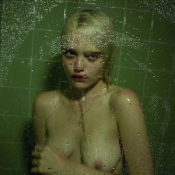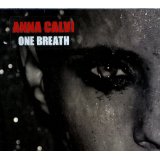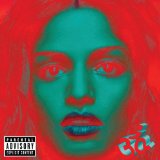 St. Vincent’s star has been steadily rising for almost eight years. Each one of her three albums has surpassed the other for originality, songwriting ability and scorching self-possession. This, her fourth and the first to be self-titled (and appropriately at that), continues with that trend. Although it may not actually be better than some of 2011’s seductive and quietly threatening “Strange Mercy”, it is a more human and bolder work and marks the introduction of an unfiltered honesty that previous albums kept closer to their chest. She has taken both musical and physical elements of the biggest and most successful pop stars of the mid-eighties and early nineties – Madonna, Prince and Michael Jackson- and compressed them into an art rock template where David Bowie continues to dominate Annie Clark’s pop-cultured psyche. But then again the eponymous naming of the album adds credence and a confidence to the idea that this could only be a St Vincent album, every second of it could have only come from Annie Clark’s own pen, her lips and guitar.
St. Vincent’s star has been steadily rising for almost eight years. Each one of her three albums has surpassed the other for originality, songwriting ability and scorching self-possession. This, her fourth and the first to be self-titled (and appropriately at that), continues with that trend. Although it may not actually be better than some of 2011’s seductive and quietly threatening “Strange Mercy”, it is a more human and bolder work and marks the introduction of an unfiltered honesty that previous albums kept closer to their chest. She has taken both musical and physical elements of the biggest and most successful pop stars of the mid-eighties and early nineties – Madonna, Prince and Michael Jackson- and compressed them into an art rock template where David Bowie continues to dominate Annie Clark’s pop-cultured psyche. But then again the eponymous naming of the album adds credence and a confidence to the idea that this could only be a St Vincent album, every second of it could have only come from Annie Clark’s own pen, her lips and guitar.
A lot of the songs on “St. Vincent” are uncoded, straightforward story-telling songs relating to Clark’s own experiences. Some of the songs are harder to decipher and are more abstract and, on occasion, surreal. If there is an underlying theme here then it is how life is now for someone who has known what it is to be online for the majority of their adulthood but who has also experienced at the start of their childhood, pre-internet life. It is the outlook of someone who has therefore placed some (healthy?) distance to the option of only living a life continually attached to a screen of some size.
The opening track “Rattlesnake” and cloudily synthetic ballad “I Prefer Your Love”, which sits in the centre of the album and quite sensibly between two of the most frenzied and odd tracks, both fall into the first category of this vivid storytelling. The metallic and brittle shake of “Rattlesnake” recounts Clark’s walk through a seemingly deserted desert, how she removes all of her clothes due to the heat and a desire to be free and connect with both the moment and the surrounding nature. The sound and then appearance of a rattlesnake provokes a fight or flight sprint back to safety. This is a very loaded image or course, phallic maybe and certainly mythical and the raise in Clark’s vocal inflection towards the end – ‘I’m not the only one!’ – and the dryness of the rhythm helps bring to life both the thrill and the fear.
“I Prefer Your Love” really does wear its heart firmly on its sleeve. Annie Clark recently very nearly lost her mother to illness and with lines like ‘wipe the blush and smudge from my cheek and wonder what will be become of your little one’, this is a last lullaby for a child whose parent means more to them than any spiritual or religious figurehead could. There is no trickery with this track, it’s a beautiful song and although the rhythm and melody of the verses sound a little like the verses of “Ashes to Ashes” and it could easily be the missing song in a quartet of Patrick Leonard-written Madonna ballads, compared to Clark’s discography thus far it is surprising for its truthfulness and sincerity.
Following last year’s sometimes successful collaboration with David Byrne, the brass funk that dominated “Love This Giant” makes a brief reappearance on the exhilarating “Digital Witness”, a better and more memorable track than any that appeared on “Giant”. Along with the eccentric and genre shifting “Huey Newton”, this song explicitly questions the point of some social media and specially that of sharing information that really requires no further spectators and the reasons why such validation is required for just about everything. Liking another person’s status when that status tells you that they are in their garden? ‘If I you can’t show it, you can’t see me; what’s the point in doing anything?’ echoes Clark. “Digital Witness” is an example of the move, albeit subtle, to songs that are as catchy as can be, subversive lyrically still but brighter and bolder than before. In another lifetime it could have been a Kid Creole and The Coconuts track. The astounding “Huey Newton” which follows a sedated lo-if r’n’b first half suddenly breaks down irreconcilably into a guitar-led psychosis-fuelled second half, initiated by nights of winter time loneliness with only Google Search for company.
“Bring Me Your Loves” is probably the most outwardly and bracingly strange moment on “St. Vincent”. It has an addled and fevered sweat and atmosphere with marching drums, multi-tracked and obnoxious harmonies frustrated by the ‘I took you off your leash but I can’t make you heel’ predicament it finds itself in. The gradually building “Regret” is a throwback in some ways to the woozy and unstable 1960s Disney soundtrack style that dominated the “Actor” album and “Birth in Reverse”, although bold in its lyrical gaucheness (‘it just an ordinary day, take out the garbage, masturbate’) and fluid and spontaneous guitar playing is a good St Vincent song but certainly not a brilliant one.
Later on, “Psychopath” delivers a taut electro-pop number which has some lovely and riveting sonic touches around the ‘ahh, ahh,ahh-ahh ahh’ refrain with everything bar the beat dropping out immediately and unexpectedly after the song’s chorus and “Prince Johnny” swoons sarcastically with divine lyrical bite. Album closer “Severed Crossed Fingers” is quite probably Clark’s best song so far, certainly featuring her most soulful performance to date. 60s girl group swells, chiming bells and guts, spleens and missing fingers. It’s interesting that the silly, noodling introduction to the track almost tries to undermine the weightiness of the sentiment, as though it’s embarrassed by its power. But its double bluff only really goes to show that St Vincent also acknowledges the absurdity that can accompany such grand gestures, that it is all still just an act and that sometimes there really is no hope left.
This is not the album with disco sounds and influences that many claim it to be (partly fuelled by St. Vincent’s description of the material herself before its release). You can dance to it, yes, but probably in the same robo-mannequin moonwalk style that Clarke herself has adopted during recent live shows. The full but still sometimes disconcertingly skeletal sound that is so intrinsically hers remains and has been honed to perfection here and the on-going production by John Congleton (previous collaborations tellingly include both Anna Calvi and Erykah Badu) is typically sharp and flawless. It seems unrealistic to expect her to stay in this role which is her most defined and confident thus far for long but for now St. Vincent has delivered her most accessible, easy to relate to, and consistently engaging and sparky album to date; if you haven’t experienced her yet then “St Vincent” is an excellent place to start.
An artist who is consumed by his own obsession with culture, music and art, West has made the most startling album of his career so far. Where lyrical and sonic power collide magnificently, thematically “Yeezus” is an album about racism and ego and sex and sounds like nothing that you’ve heard from any of the rap or pops big players this year. Always one step ahead of every genre, West has made an album that incorporates brutal and beautiful techno, Nina Simone, Marilyn Manson and Daft Punk sounding like you wish they did on their own record. A collection that restores faith in creativity and the passion of self-expression; Kanye West really may be a god, just please don’t tell him.
In addition to changing their name and downsizing in 2013, NYPC (formerly known as New Young Pony Club) have somewhat surprisingly also released a brilliant record. Their self-titled third album is proof that the key members of this group needed to lighten the load somewhat in order to deliver what they’ve promising since 2005’s tasty ”Ice Cream”. This, their best album by some distance, is a master class in electronic pop music that has personality and class. Concise, muscular with divine melodies and gleaming electronics throughout, it puts the rather substantial competition in the shade.
Miley may have got their first with the “Bangerz” title but MIA’s outstanding fourth album is stacked to the ceiling with them. This was always going to be a difficult release as the critical spotlight had suddenly turned on the Sri Lankan-born and London-based rapper but instead of getting mad, MIA got ecstatic. Vocals that can sound like gunshots, delirious rhythms and textures and just one massive indie, world-rave bash after another; “Mantangi” is the most pure and celebratory representation of MIA to date.
 Sky Ferreira – “Night Time, My Time”
Sky Ferreira – “Night Time, My Time”
Oh, Sky, the ultimate 21st century pop star who never releases any music, until now, sort of. Still unavailable in the UK, Sky Ferreira’s debut album was finally released in some parts of the world in late 2013. Nearly four years in the making, it’s a far cry from her earlier electro pop, although traces remain if you listen hard enough. Sounding like it was recorded in 1978 and produced by Mike Chapman, the missing album between Blondie’s “Plastic Letters” and “Parallel Lines” would just about do it justice. A big, weird rock’n’pop album that entrances with liquid melodies and Ferreira’s ability to seduce just about anyone, this is music that was made for the Top of the Pops studio and a massive great hairbrush.
Some of the year’s most intricate and soulful music, and this is indeed an extremely musical album, can be heard on Anna Calvi’s intimate and daring second album “One Breath”. Partly because of the assertive and very academic use of an orchestra, Calvi has created songs which take expected turns into light and dark. Like a more feral and restless sister recording to Agnes Obel’s also excellent 2013 album “Aventine”, “One Breath” is both a dramatic and cathartic experience that firmly cements Anna Calvi’s place within the genre.
 Anna Calvi’s debut album was heralded as a new classic within moments of its release. It was florid and troubled, being close cousins to artists such as Nick Cave and with a cinematic cloak draped over it as if imagined by David Lynch at his most romantic and doomed. It was also produced by Rob Ellis, long-time collaborator with PJ Harvey. Ah yes, PJ Harvey. It would be almost irresponsible as a reporter of music not to acknowledge that both artists can share a writing and melodic style, vocal comparisons can on occasion be made between Calvi and Harvey and both fall into the same genre of woman with a guitar (sometimes), not passive, singer-songwriter blues/rock, visually hyper-stylised , entertainer. There are many people who have made records over the past decade or so where the influence of PJH is undeniable but unlike the majority, Calvi’s talent is the actual link between the two and not her desire to mimic Harvey. This is reinforced here on her second album, the radiant and self-possessed “One Breath”. After the stalking guitars and ghostly ‘ooh-oooh’s’ of “Suddenly” and “Eliza” with its thumping strum, it’s only on the third track, “Piece by Piece”, that Calvi deviates from the sonic template previously established on her debut. After the broken and collapsing strings of the intro a rhythmic, tumbling drum snaps into shape and a plucked mandolin and various electronic zips and pops swoon around Calvi who has conjured up the spirit of Siouxsie Sioux here, whilst a scuzzy bass muscles up against an airy string part. The total effect is mesmerising. It’s these string sections, very much a musical theme here, that give “One Breath” its power, the push and pull between light and dark. Producer John Congleton, who has, amongst others, worked with Joanna Newsom and St Vincent, helped create a sumptuous but frequently uneasy and volatile soundscape throughout. Calvi has spoken out about how during the making of this album she suffered from very low moods and that someone very close to her died. It is likely that this in some part went toward dictating the themes and mood of this album and the title track is the boulder around which each track is laid. ‘I got one, I got one breath to give ….it’s going to change everything’ Calvi repeats as though a mantra whilst everything around her is building unforgivingly and then, precisely at the 3 minute mark, a gorgeous orchestral coda breaks through the tension and instantly lifts Calvi, and the listener, wordlessly away to a safer and more beautiful place. It’s both moving and dramatic, a combination of theatre and absolute sincerity. Elsewhere, the near 6 minute “Carry Me Over” with its demonically euphoric final minute of Calvi’s rapturous wails pillowed by the continuing orchestration is a genuine tour de force and “Sing to Me”, which regularly threatens to break into “River Deep, Mountain High”, is an authentic and commanding torch song. After this heightened sensation of a noir love story gone awry , the false start of the rock roll throb of the most straightforward song here, “Love of My Life”, is an unexpected and thrilling thump in the eye. The shortest and perhaps most breath-taking song here is the album closer “The Bridge”, an acapella, choral hymn that chills and will make many misty-eyed with its simple, crystalline beauty. In some ways Anna Calvi has toned down the theatrics and threat that dominated her debut and replaced them with a more nuanced and considered account of a persona under attack but ultimately, and appropriately breathtakingly, breaking free from previous restraints, self-imposed or otherwise. Without doubt the drama and darkness are still present, but on “One Breath” Calvi has created a collection of songs which reflect and show her as an exceptional artist in her own right as opposed to a great artist within the genre. If you want to be genuinely thrilled and startled by music that twists and turns in unpredictable shades and volumes then Anna Calvi has made an album to treasure and completely immerse yourself into, it’s quite an accomplishment.
Anna Calvi’s debut album was heralded as a new classic within moments of its release. It was florid and troubled, being close cousins to artists such as Nick Cave and with a cinematic cloak draped over it as if imagined by David Lynch at his most romantic and doomed. It was also produced by Rob Ellis, long-time collaborator with PJ Harvey. Ah yes, PJ Harvey. It would be almost irresponsible as a reporter of music not to acknowledge that both artists can share a writing and melodic style, vocal comparisons can on occasion be made between Calvi and Harvey and both fall into the same genre of woman with a guitar (sometimes), not passive, singer-songwriter blues/rock, visually hyper-stylised , entertainer. There are many people who have made records over the past decade or so where the influence of PJH is undeniable but unlike the majority, Calvi’s talent is the actual link between the two and not her desire to mimic Harvey. This is reinforced here on her second album, the radiant and self-possessed “One Breath”. After the stalking guitars and ghostly ‘ooh-oooh’s’ of “Suddenly” and “Eliza” with its thumping strum, it’s only on the third track, “Piece by Piece”, that Calvi deviates from the sonic template previously established on her debut. After the broken and collapsing strings of the intro a rhythmic, tumbling drum snaps into shape and a plucked mandolin and various electronic zips and pops swoon around Calvi who has conjured up the spirit of Siouxsie Sioux here, whilst a scuzzy bass muscles up against an airy string part. The total effect is mesmerising. It’s these string sections, very much a musical theme here, that give “One Breath” its power, the push and pull between light and dark. Producer John Congleton, who has, amongst others, worked with Joanna Newsom and St Vincent, helped create a sumptuous but frequently uneasy and volatile soundscape throughout. Calvi has spoken out about how during the making of this album she suffered from very low moods and that someone very close to her died. It is likely that this in some part went toward dictating the themes and mood of this album and the title track is the boulder around which each track is laid. ‘I got one, I got one breath to give ….it’s going to change everything’ Calvi repeats as though a mantra whilst everything around her is building unforgivingly and then, precisely at the 3 minute mark, a gorgeous orchestral coda breaks through the tension and instantly lifts Calvi, and the listener, wordlessly away to a safer and more beautiful place. It’s both moving and dramatic, a combination of theatre and absolute sincerity. Elsewhere, the near 6 minute “Carry Me Over” with its demonically euphoric final minute of Calvi’s rapturous wails pillowed by the continuing orchestration is a genuine tour de force and “Sing to Me”, which regularly threatens to break into “River Deep, Mountain High”, is an authentic and commanding torch song. After this heightened sensation of a noir love story gone awry , the false start of the rock roll throb of the most straightforward song here, “Love of My Life”, is an unexpected and thrilling thump in the eye. The shortest and perhaps most breath-taking song here is the album closer “The Bridge”, an acapella, choral hymn that chills and will make many misty-eyed with its simple, crystalline beauty. In some ways Anna Calvi has toned down the theatrics and threat that dominated her debut and replaced them with a more nuanced and considered account of a persona under attack but ultimately, and appropriately breathtakingly, breaking free from previous restraints, self-imposed or otherwise. Without doubt the drama and darkness are still present, but on “One Breath” Calvi has created a collection of songs which reflect and show her as an exceptional artist in her own right as opposed to a great artist within the genre. If you want to be genuinely thrilled and startled by music that twists and turns in unpredictable shades and volumes then Anna Calvi has made an album to treasure and completely immerse yourself into, it’s quite an accomplishment.






